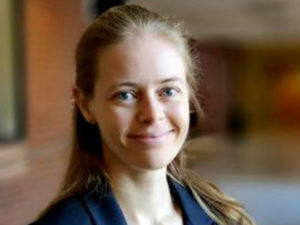
Date: January 10, 2020
Time: 3:30 - -
Location: Edward C Taylor Auditorium, Frick B02
Dr. Eva Nichols
Department of Chemistry
Yale University
Biologically-inspired control of protons and electrons for sustainable energy transformations
The development of molecular and materials electrocatalysts offers an attractive means to generate value-added products using abundant chemical feedstocks and sustainable energy. Various strategies employed by enzymes suggest a way forward for the design of improved synthetic catalysts, including precise positioning of secondary coordination sphere groups and the establishment of electric fields that are believed to contribute to reactivity.
The first part of this presentation will focus on the development of biologically-inspired molecular catalysts for electrochemical carbon dioxide reduction. The positional dependence of proton- and hydrogen bond donors in the second coordination sphere will be discussed in this context. In the second part, our focus will shift to examining electrode interfaces, where reaction conditions differ vastly from those in bulk solution. Using an infrared spectroelectrochemical approach, proton transfers can be followed as a function of applied potential and correlated with measured interfacial electric fields. This analysis establishes a starting point for the design of biologically-inspired electrocatalytic interfaces that resemble enzyme active sites with precisely tuned electric fields.
01/10/2020 3:30 PM
_
America/New_York
Biologically-inspired control of protons and electrons for sustainable energy transformations
Dr. Eva Nichols, of Yale University, will speak on “Biologically-inspired control of protons and electrons for sustainable energy transformations”.
Edward C Taylor Auditorium, Frick B02